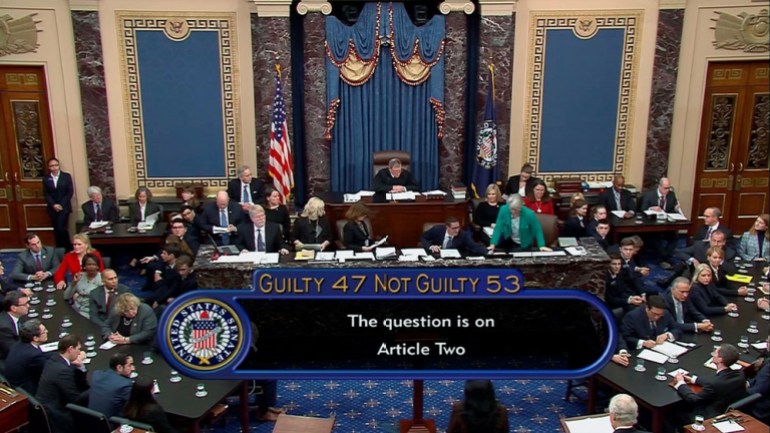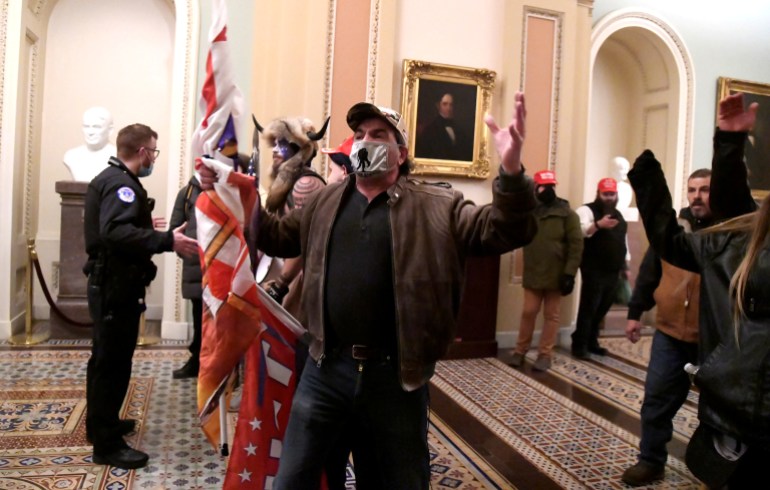‘Toothless tiger’: Impeachment could bar Trump from future office | US Elections 2020 News
An extraordinary breach of the United States Capitol by rioters egged on by President Donald Trump has led legislators into uncharted territory as they set course for impeachment with just days left in Trump’s term.
Democrats in the US House of Representative have said they will introduce an Article of Impeachment against Trump as soon as Monday, accusing him of engaging “in high Crimes and Misdemeanors by willfully inciting violence against the Government of the United States”.
In his repeated attempts to undermine the election and his directive for supporters to march on the seat of the US legislature on January 6 as Congress met to certify the victory of President-elect Joe Biden, Trump “betrayed his trust as President”, the lawmakers argue.
The move has the potential to shape the early days of Biden’s presidency, as well as the US political landscape for years to come – as Trump could be barred from holding federal office again in the future, experts said.
“The fact that that could be the consequence could be a death blow to Trump,” Alan Baron, a former special counsel to the House of Representatives during four impeachment inquiries against federal judges, told Al Jazeera.
The Article of Impeachment: Incitement to Insurrection, drafted by Rep @davidcicilline, @RepRaskin, me & @HouseJudiciary staff now has *200* cosponsors. https://t.co/1AtR7Xam86
— Ted Lieu (@tedlieu) January 10, 2021
For Trump to be impeached, the article must pass a majority vote in the House before it can be sent to the Senate for a trial. The measure then requires two-thirds support in the Senate for the president to be convicted and removed from office.
Then, Baron explained, a subsequent Senate vote, “historically involving only a simple majority”, could then bar the impeached president from ever holding public office again.
As of Sunday, the Article of Impeachment against Trump had 200 co-sponsors in the 435-seat chamber, where Democrats hold a slim majority.
With the party also set to soon take majority control of the Senate, impeachment could be a “practical” move aimed at preventing Trump from running for president again in 2024 – or a “symbolic” rebuke of his actions, said Baron.
“There’s been talk about Trump’s role as the sort of the government in exile, with regard to rallying Republicans when he’s out of office,” he said. “If he’s barred from holding any federal office, he’s kind of a toothless tiger.”
 US senators casting their votes during the 2020 Senate impeachment trial of President Donald Trump [Reuters]
US senators casting their votes during the 2020 Senate impeachment trial of President Donald Trump [Reuters]Constitutional question
A Senate trial is unlikely to happen before Trump leaves office on January 20, however.
Even if Senate Majority Leader Mitch McConnell cooperated with a trial before Biden takes office – which he has said he will not – observers said it is all but logistically impossible to pull off such a high-stakes trial in the short timeframe.
Meanwhile, Democratic Representative James Clyburn on Sunday suggested that the House may wait to send the Article of Impeachment to the Senate until 100 days into Biden’s presidency, as to not mar his early days in office.
That means legislators’ hopes of barring Trump from future office will hinge on a constitutional question of whether a Senate impeachment trial can proceed after a president has already left the White House.
“The constitutional text is not clear on that point,” Thomas M Keck, a professor of political science at Syracuse University, told Al Jazeera, adding though that “most constitutional scholars who study impeachment agree that the trial and conviction can happen after he leaves office.”
“This is a debatable interpretation of the meaning of the Constitution,” he added, “but my understanding is that, so long as the process is initiated while someone is still in office, it can continue to a conclusion, even if that person leaves office.”
Philip Bobbitt, a Columbia University constitutional scholar, told Al Jazeera that while he believed legislators have grounds for impeachment, “in my opinion … you can’t impeach someone who’s not in office.”
Bobbitt said that based on his interpretation, a Senate trial would have to be completed before January 20, which he called “unrealistic”.
If a trial were to proceed after Trump leaves office, Bobbitt said, “I think it would be an appropriate defence by the former president’s party to say that he’s no longer an officer of the United States.”
‘Historical record’
Even if the trial is allowed to proceed after Trump leaves office, Democrats will likely face an uphill battle in convincing the 16 Republican Senators needed to reach a two-thirds majority in the chamber to vote to impeach.
In recent days, at least two Republican senators, Pat Toomey and Lisa Murkowski, have called for Trump to resign.
Other Republican legislators have said they support the invocation of the 25th Amendment, a constitutional provision that allows Trump’s cabinet and the vice president to remove him from office if they deem him unable to perform his duties.
 Supporters of President Donald Trump riot on the second floor of the US Capitol on January 6 [File: Mike Theiler/Reuters]
Supporters of President Donald Trump riot on the second floor of the US Capitol on January 6 [File: Mike Theiler/Reuters]Vice President Mike Pence has said he opposed the idea of invoking the 25th Amendment, an adviser recently said, while some Republican lawmakers have urged Biden to stop Democrats’ effort to impeach, saying it risked making it difficult to unify the country after the Capitol violence.
Still, opinions could change as more evidence emerges from the riot, in particular, whether directives from the Trump administration contributed to a delayed response from federal security agents.
Impeachment by the House would also still send a message to future US leaders, Keck said.
“Even if barring Trump from holding future office falls short, then you’ve marked him as the only president in history to be impeached twice,” Keck said.
“It has to be a matter for the historical record to say that inciting a mob to attack the Congress and try to prevent them from certifying the results of an election is unacceptable behaviour.”
